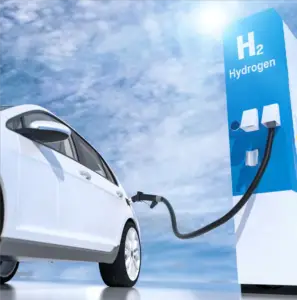
Why in News: Nitin Gadkari’s Vision to Eliminate Petrol and Diesel Vehicles
- In a bold move towards sustainability and environmental conservation, Union Minister Nitin Gadkari has set forth an ambitious goal to rid India of petrol and diesel vehicles entirely.
- This visionary initiative is part of his broader mission to transform India into a green economy, paving the way for a cleaner and more sustainable future.
Gadkari’s Vision: A Green Revolution
- Nitin Gadkari, the Union Minister for Road Transport and Highways, envisions a future where India no longer relies on fossil fuels for transportation.
- In an interview with PTI, he expressed his firm belief that it is not only possible but imperative for India to transition to alternative fuels and electric vehicles.
- By eliminating petrol and diesel vehicles, Gadkari aims to reduce India’s dependence on fuel imports, which currently amount to a staggering Rs 16 lakh crore.
The Roadmap to Green Mobility
- To realize his vision, Gadkari has proposed several key initiatives. One of the major proposals is to slash GST on hybrid vehicles to encourage their adoption.
- Additionally, he advocates for the use of biofuels as a viable alternative to traditional fossil fuels.
- Gadkari’s focus on promoting green mobility aligns with the government’s broader agenda of building a sustainable and self-reliant India.
Challenges and Opportunities
- While Gadkari’s vision is ambitious, it is not without its challenges.
- Transitioning away from petrol and diesel vehicles will require significant infrastructure development and investment in alternative energy sources.
- Moreover, there are concerns about the environmental impact of electric vehicles, particularly in terms of electricity generation.
- Environmental activists have welcomed Gadkari’s vision for increasing green mobility but have also urged caution.
- They emphasize the importance of transitioning to renewable energy sources alongside electric vehicles to truly tackle the climate crisis.
- Gadkari acknowledges these concerns but remains optimistic about the feasibility of his plan.
The Path Ahead
- Despite the challenges, Gadkari is confident that India can achieve its green mobility goals within the next five to seven years.
- He cites the rapid advancements in electric vehicle technology and the increasing interest from auto manufacturers as signs of progress.
- Gadkari envisions a future where electric vehicles, biofuels, and other alternative fuels power India’s transportation sector, leading to a significant reduction in fuel imports and a boost to the country’s self-reliance.
Conclusion
- Nitin Gadkari’s vision to eliminate petrol and diesel vehicles represents a bold step towards a greener and more sustainable future for India.
- By embracing alternative fuels and electric vehicles, India can reduce its carbon footprint, enhance energy security, and promote economic growth.
- While the path ahead may be challenging, Gadkari’s unwavering determination and innovative approach offer hope for a brighter tomorrow.
People also ask
Q1: What is the goal set by Union Minister Nitin Gadkari regarding petrol and diesel vehicles in India?
Ans: Nitin Gadkari aims to eliminate all petrol and diesel vehicles from Indian roads entirely.
Q2: Is it feasible to completely phase out petrol and diesel vehicles in India?
Ans: While challenging, Gadkari believes it is possible with the right policies and initiatives.
Q3: What measures does Gadkari propose to achieve this goal?
Ans: Gadkari suggests reducing GST on hybrid vehicles to incentivize their adoption and promoting the use of alternative fuels like biofuels.
Q4: What impact will the elimination of petrol and diesel vehicles have on India’s economy?
Ans: Gadkari believes it will lead to a reduction in fuel imports, which can be redirected towards rural development and employment generation.
Q5: Is there a timeline for achieving this objective?
Ans: Gadkari has not specified a timeline, but he is confident that with concerted efforts, India can transition away from petrol and diesel vehicles.
Your point of view caught my eye and was very interesting. Thanks. I have a question for you.
Your article helped me a lot, is there any more related content? Thanks!
Thank you for your sharing. I am worried that I lack creative ideas. It is your article that makes me full of hope. Thank you. But, I have a question, can you help me?